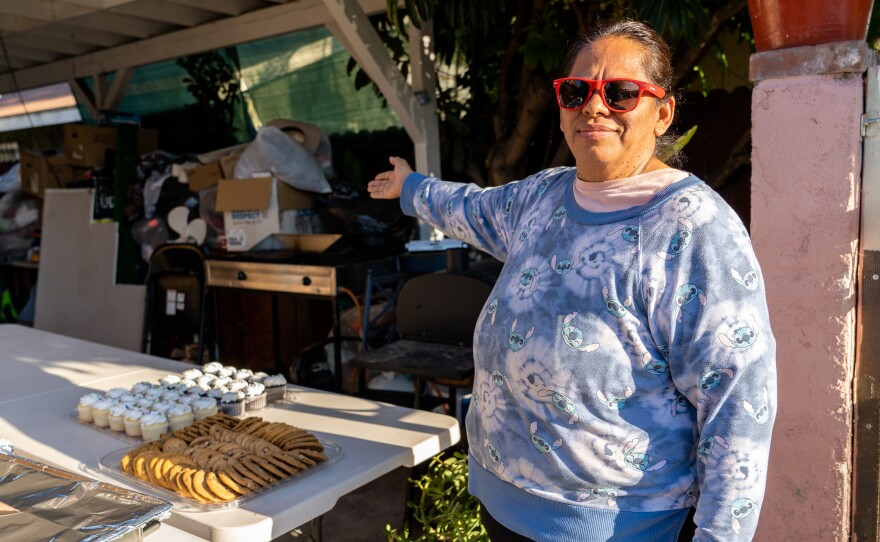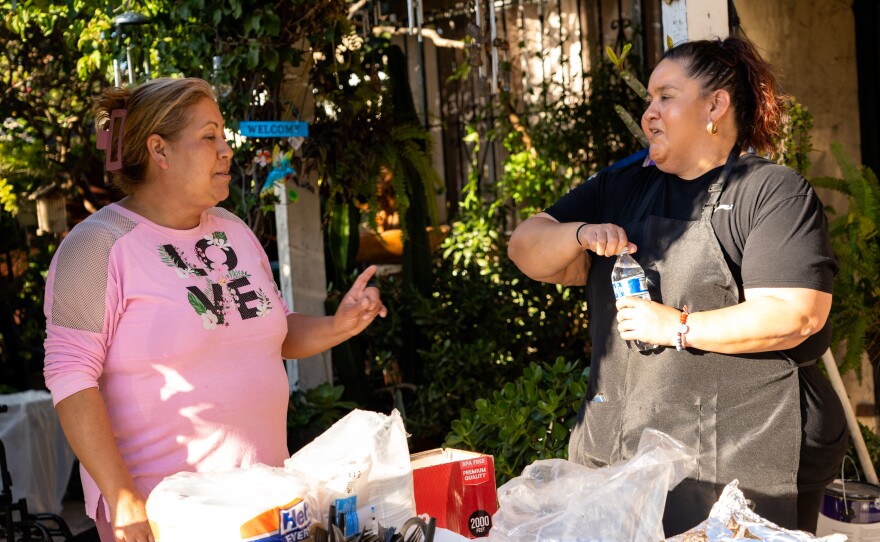Steam and sizzles fill the cramped kitchen as Isa Rosales cooks — chicken and pork, rice and beans, potatoes and carrots. Fifty pounds of it. All for people she met less than three months ago.
“I don’t want to just make them whatever,” she said. “I want to make them food like if I was feeding my family. They deserve it.”
Rosales lives in El Cajon. She began bringing hot meals to feed Shelltown residents weeks after the January flood devastated the neighborhood just north of National City.
Like many in the county, she was removed from the impacts of the flood.
“I knew it had rained, but I didn't know the damage because I don't like to watch the news,” she said.
Then, she started to see images of the destruction on Facebook.
She’s a single mother of three. She cooks for multiple small businesses she runs.
But she felt compelled to help.
“I just started to pray, like, ‘How can I be used?’” she said.
Her first trip to Shelltown brought new reality to the images she’d seen.
“I cried as soon as I got there because I couldn't — I couldn’t understand the devastation in the streets,” she said.
Rosales couldn’t fix everything she was seeing, but what she could do was cook.

“I try to celebrate with people, even in the darkest times,” she said. “Food does that for us.”
Many Shelltown residents still don’t have working kitchens, stoves or sinks.
They improvise with portable cooktops and microwaves.
“I can’t imagine not having a stove and being able to cook a hot meal. For me, growing up, a hot meal was family,” she said.
Every aspect of the flood survivors’ lives were in limbo, she thought, and they weren’t even afforded the stability of sitting down to a hot meal with family.
Rosales began working with a community organization, Herencia Hispana, to cook hot meals for the neighbors.
She got to know Beba Zárate, who hosts the meal distribution.
Now, she drives to Zárate’s house and sets the table for Shelltown neighbors.

The neighbors walk over slowly. Zárate said the flood changed the pace of the neighborhood.
The disaster feels more recent than three months ago.
Sandbags still pile on the sidewalk. A large dumpster sits in the street.
To show how high it flooded on Jan. 22, Zárate pointed about four feet up her wall.
“It is like a horrible movie,” she said — everything was dark. Mud and trash were everywhere. Even dead animals. “It was like a nightmare in the middle of the morning.”
Her house is mostly empty of personal belongings, all lost to the flood. A few family photos, hung high on the wall, remain.
But donations for distribution to flood survivors are piled to the carport ceiling: garbage bags of clothes, a folding chair and a small fan.

President Joe Biden declared a major disaster a month after the flood.
There are two days left to apply for FEMA assistance, up to $42,500 per household for housing assistance, repairs and property loss.
But there are citizenship and immigration requirements.
And though FEMA has helpline operators and translated materials, Zárate says it can be hard for some of her neighbors to navigate the process.
To date, FEMA has distributed over $20 million to 2,646 impacted individuals. About 700 applications are still in process.
A FEMA spokesperson said the most common reason for assistance denial is survivors not connecting with a FEMA home inspector.
“This can happen if the applicant misses the inspectors' attempts to contact them three times or is not home during their scheduled appointment,” the spokesperson said.
Zárate has lived in her house for 25 years.
The street it’s on connects to the freeway and an elementary school.
It used to be filled with traffic and children.
Now it’s a “ghost street,” she said.
Many families’ homes were too damaged to live in. The county moved them into hotels.
“It is like really scary not having those smiles here around in the neighborhood,” she said.

The news cycle has largely moved on. But it’s not so easy for the residents.
“It is a long recovery process,” Zárate said. “In the first month, it was like cover the basic needs. But now this is the reality. You have to face your reality that you do not have anything that you used to have to live, to survive. Now we are struggling with ourselves, but also with our mental health.”
The water has dried, but she said it left behind PTSD.
She explained how it feels.
“It is like the emotions are numb. It is like when you have anesthesia and you are barely waking up, this is how we are feeling. We are like color blind. You can see the color, but we cannot see the colors. We are trying to, but it's really hard,” she said.
She said the shared hardship has knit the neighborhood together like a family.
“We're holding hands and say, ‘We are together in this.’ And it is so much loving to see a survivor that is cooking in the backyard for the whole community or say, ‘You know what? This is what I have. I share with you and I share with the whole community.’”
Sometimes, she said, she and some neighbors pool their change together and buy a hamburger to split between them on her patio.
She said the tragedy upended their daily routines. But she sees a gift in that, too.
“The life twist,” she explained. “It goes like 365 degrees different from time before. But now we value more life. We value more the sense of how to be alive. It is a gift to be alive. “

Witnessing those lives is the gift volunteer Isa Rosales said she brings to Zárate and her neighbors.
“She said, ‘I don't want nobody to forget about us,’” Rosales said, remembering a conversation with Zárate. “And I said, ‘Don't worry, we won't forget about you.’”
Zárate is just one of more than a thousand flood victims still figuring out how to survive.





